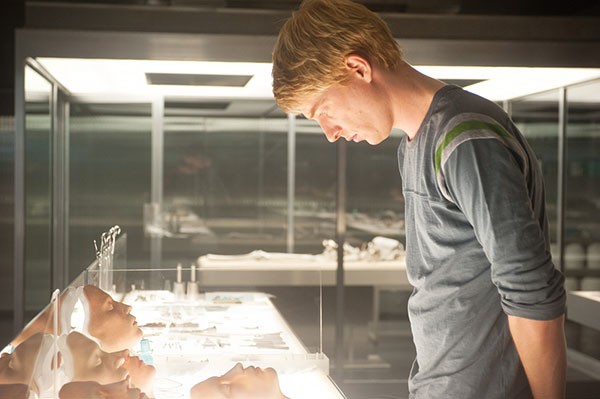Movies about robots, androids and other artificially intelligent humanoid creations are always fascinating explorations. Can we create machines that look like us, think like, feel like us? What responsibilities, risks and rewards come with such god-like power? Isn't the most successful AI the one with the potential to get smarter than us, and then what?
All these thorny queries and more are forefront in writer-director Alex Garland's debut feature, Ex Machina. It's a hard sci-fi drama that finds its thrills not in space travel or laser battles, but through theoretical arguments, a locked-box set-up and ever-shifting psychodrama between its three characters.
Caleb (Domhnall Gleeson) is a coder for a Google-like Internet company and wins a workplace lottery. His prize: a week with the firm's reclusive, brilliant founder, Nathan, at his very remote, off-the-grid home and private research lab. Once there, Caleb discovers the true awesomeness of the prize: Nathan (Oscar Isaac) has created a close-to-perfect AI woman named Ava, and would Caleb mind putting Ava through the Turing test to ascertain if she could pass for human?
Typically, Ava (Alicia Vikander) has been created in an idealized female form: beautiful and curvy. It's hard to know where to lay the blame: The default setting for female AI in films is sex object-like. But the narrative offers a few loopholes: Ava appears to be just the sort of sexy fem-bot that the aggressively macho and hedonistic Nathan would create for himself, and if one were building an AI to fool humans, attractiveness would be a useful tool. The representation of Ava is among the many open-ended queries of Ex Machina sure to generate lively post-screening discussions. (A side note: The film doesn't have many special effects, but the half-human, half-transparent-machine presentation of Ava is a good one.)
Caleb begins questioning Ava, who in her attempts to read human, begins questioning him. After each Turing session, Nathan questions Caleb about Ava, while Caleb questions Nathan's motivations. Thus, a simple "fun" week of talking to a robot grows increasingly fraught: Alliances form and splinter; control shifts depending who is currently drunk, powered down or being lied to; the electricity flicks off and on. So much mystery, distrust and real and/or programmed emotions — with three highly intelligent lifeforms locked up in a concrete bunker of a house, of course it will go bad. The question is simply how?
Provocative, well acted (with another new, almost feral performance from Isaac) and full of timely, unsettling queries about the increasingly blurred line between humans and human-created machines designed to act and even think like humans, Ex Machina deserves a look — and a think.















